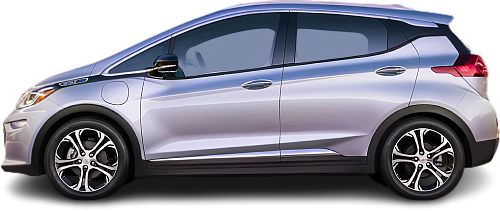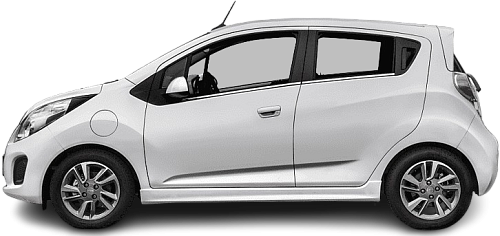Global EV Comparison: Chevrolet Bolt EV Gen 1 vs Spark EV 19 kWh
Struggling to Decide? Let AI Help!
Your AI Summary Is Ready!
General Info
Both vehicles have been discontinued and were never available for sale in Europe.
The two vehicles share the same body style: Hatchback.
| Property | Chevrolet Bolt EV Gen 1 | Chevrolet Spark EV 19 kWh |
|---|---|---|
| Years of Production | 2017-2019 | 2015-2017 |
| Current Status | Discontinued | Discontinued |
| Country of Manufacture | USA | South Korea |
| Body Style | Hatchback | Hatchback |
| Market Availability | USA | USA |
| GCC Score | 5.1 | 4.2 |
Range and Efficiency
While the Chevrolet Bolt EV Gen 1 (2017-2019) offers a longer real-world range and a bigger battery, it is less energy-efficient than the Chevrolet Spark EV 19 kWh (2015-2017).
| Property | Chevrolet Bolt EV Gen 1 | Chevrolet Spark EV 19 kWh |
|---|---|---|
| Range (EPA) | 383 km | 132 km |
| Range (GCC) | 364 km | 125 km |
| Battery Capacity (Nominal) | 60 kWh | 19 kWh |
| Battery Capacity (Usable) | 57 kWh | 18 kWh |
| Efficiency per 100 km | 15.7 kWh/100 km | 14.4 kWh/100 km |
| Efficiency per kWh | 6.39 km/kWh | 6.94 km/kWh |
| Range and Efficiency Score | 7 | 5.6 |
Charging
Both vehicles utilize a standard 400-volt architecture.
Both vehicles support DC fast charging with a maximum power of 50 kW.
The Chevrolet Bolt EV Gen 1 (2017-2019) features a more powerful on-board charger, supporting a maximum AC charging power of 7.2 kW, whereas the Chevrolet Spark EV 19 kWh (2015-2017) is limited to 3.3 kW.
| Property | Chevrolet Bolt EV Gen 1 | Chevrolet Spark EV 19 kWh |
|---|---|---|
| Max Charging Power (AC) | 7.2 kW | 3.3 kW |
| Max Charging Power (DC) | 50 kW | 50 kW |
| Architecture | 400 V | 400 V |
| Charge Port | CCS Type 1 | CCS Type 1 |
| Charging Score | 4.3 | 2.6 |
Performance
Both vehicles are front-wheel drive.
The Chevrolet Bolt EV Gen 1 (2017-2019) boasts greater motor power and accelerates faster from 0 to 100 km/h.
| Property | Chevrolet Bolt EV Gen 1 | Chevrolet Spark EV 19 kWh |
|---|---|---|
| Drive Type | FWD | FWD |
| Motor Type | PMSM | PMSM |
| Motor Power (kW) | 150 kW | 105 kW |
| Motor Power (hp) | 201 hp | 140 hp |
| Motor Torque | 360 Nm | 444 Nm |
| 0-100 km/h | 7.2 s | 7.5 s |
| Top Speed | 146 km/h | 145 km/h |
| Performance Score | 3.5 | 3.4 |
Dimensions
The Chevrolet Bolt EV Gen 1 (2017-2019) is longer and wider, but about the same height as the Chevrolet Spark EV 19 kWh (2015-2017).
The Chevrolet Bolt EV Gen 1 (2017-2019) boasts a more extended wheelbase.
| Property | Chevrolet Bolt EV Gen 1 | Chevrolet Spark EV 19 kWh |
|---|---|---|
| Length | 4166 mm | 3721 mm |
| Width (with Mirrors) | 2039 mm | - Width (with Mirrors) |
| Width (w/o Mirrors) | 1765 mm | 1626 mm |
| Height | 1595 mm | 1590 mm |
| Wheelbase | 2601 mm | 2375 mm |
Cargo and Towing
The Chevrolet Bolt EV Gen 1 (2017-2019) provides more cargo capacity, featuring both a larger trunk and more space with the rear seats folded.
Neither car is equipped with a frunk (front trunk).
Neither vehicle is officially rated for towing in in the EU.
| Property | Chevrolet Bolt EV Gen 1 | Chevrolet Spark EV 19 kWh |
|---|---|---|
| Number of Seats | 5 | 4 |
| Curb Weight | 1624 kg | 1300 kg |
| Cargo Volume (Trunk) | 479 l | 273 l |
| Cargo Volume (Max) | 1603 l | 663 l |
| Cargo Volume (Frunk) | - Cargo Volume (Frunk) | - Cargo Volume (Frunk) |
| Towing Capacity | - Towing Capacity | - Towing Capacity |
| Cargo and Towing Score | 4.7 | 4.2 |




